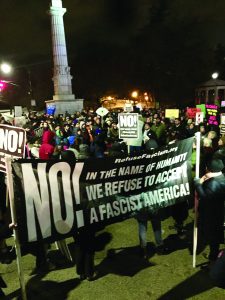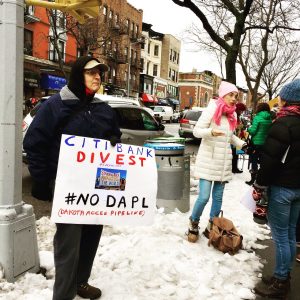With news of record high temperatures holding over the Arctic, visa bans stranding travelers in mid-flight, Congress still toying with the idea of messing with millions of Americans’ health insurance, and myriad other crises of law and justice that seem to be bombarding us with surreal frequency lately, it has become clear that we as a citizenry are going to have to get more creative in how we unite and defend our environment and one another.
History shows that one of the surest ways to get bad actors to behave is money. Whether it is a private citizen, corporation, or government behaving badly, boycotts that threaten a significant loss of funds have witnessed centuries of success. In the 1760s, a tea boycott worked for the Daughters of Liberty, causing the British Crown to repeal the Stamp Act. In the 1950s, a bus boycott forced the city of Montgomery, AL to integrate its busses. In 2015, a Mizzou football team boycott caused the university president to resign, and justrecently the #deleteUber campaign brought the ride-sharing giant’s CEO to his knees.
So, which of the many injustices out there should concerned Park Slopers target with a boycott today?

One the most urgent crises facing all humanity, Park Slope and beyond, is the changing climate. Earth’s glaciers are melting, carbon gases are pouring into the atmosphere, and vulnerable species of plants and animals are disappearing faster than scientists can keep track. That’s not to say that visa bans, immigration raids, and lost health insurance are not urgent or important – they are. It’s just that if current warming trends continue, and our ecosystem hurtles toward collapse, those and pretty much all other issues are moot.
According to Defund DAPL (www.defunddapl.org), nearly every financial institution American consumers do daily banking business with is invested in one or more fossil fuel infrastructure projects that accelerate climate change and threaten drinking water. The Dakota Access Pipeline alone is funded by Citigroup, TD Securities, Bank of Tokyo Mitsubishi, Mizuho Bank, Wells Fargo, Bank of America, Chase, HSBC, and just about every other large bank that comes to mind.
Multiple cities, including Seattle and Davis, CA, have led the way and divested more than $4 billion in public funds from these banks. Many private citizens have done the same, taking more than $74 million out of their savings and checking accounts and transferring it into credit unions and locally owned banks. While this is commendable, these sums are thus far merely drops in a bucket for banks with profits in the trillions.

According to the 2010 Census, the neighborhood of Park Slope has 65,000 residents, a number that grows to 105,000 when including Community District Six. Annual income mapping shows that residents of this neighborhood, were they to decide on a cause to unite around, could strategically deploy $6-10 billion in annual economic leverage — meaning a united Park Slope could by itself quadruple the size of Defund DAPL’s boycott right now.
Which leads to the main question(s) for those considering making the move to divest: What will it cost in terms of risk, lost time, and daily big banking convenience?
To find out I sought out Jules S., a teacher in Park Slope who recently made the switch from JP Morgan Chase to Amalgamated Bank:
“I’ve been meaning to do this for a while,” he told me over the phone when I spoke to him last week.
“How long did the switch take?”
“About a month in all, including direct deposit. I set up the new account, made a list of my deposit and bill pay accounts, and then switched them over one at a time.”
“And were there any services that you lost?”
“So far it’s been the same. Direct deposit, online bill pay, photo check cashing—it’s all there, none of it has changed.”
“What about ATM locations, though?” I interrupted, referencing what I expected to be the biggest issue in terms of convenience.
“Amalgamated uses Allpoint ATMs. They’re in 7-11, CVS, Walgreens, and a lot of bodegas and shops. I’ve honestly never had a problem finding one.”
The only other point of concern I could find was deposit insurance coverage from the FDIC, but it turns out most credit unions are insured by NCUSIF, roughly equivalent to the FDIC, and most small banks retain the same FDIC deposit protections as large ones.
As long you do your homework first and find the right credit union (which you can do at culookup.com/), or bank—Amalgamated Aspiration, Carver, and Spring are four good local options—you can find virtually all of the same services, access to ATMs, deposit insurance, and other conveniences as before, which means that for those Brooklyn residents who do most of their banking in and around New York City, there’s no good reason not to switch.
So, Park Slopers, District Sixers, and the rest of our Brooklyn family with accounts at banks that fund environmentally destructive infrastructure projects such as DAPL, I’d say it’s about high time we got our divestment boycott on, wouldn’t you?
